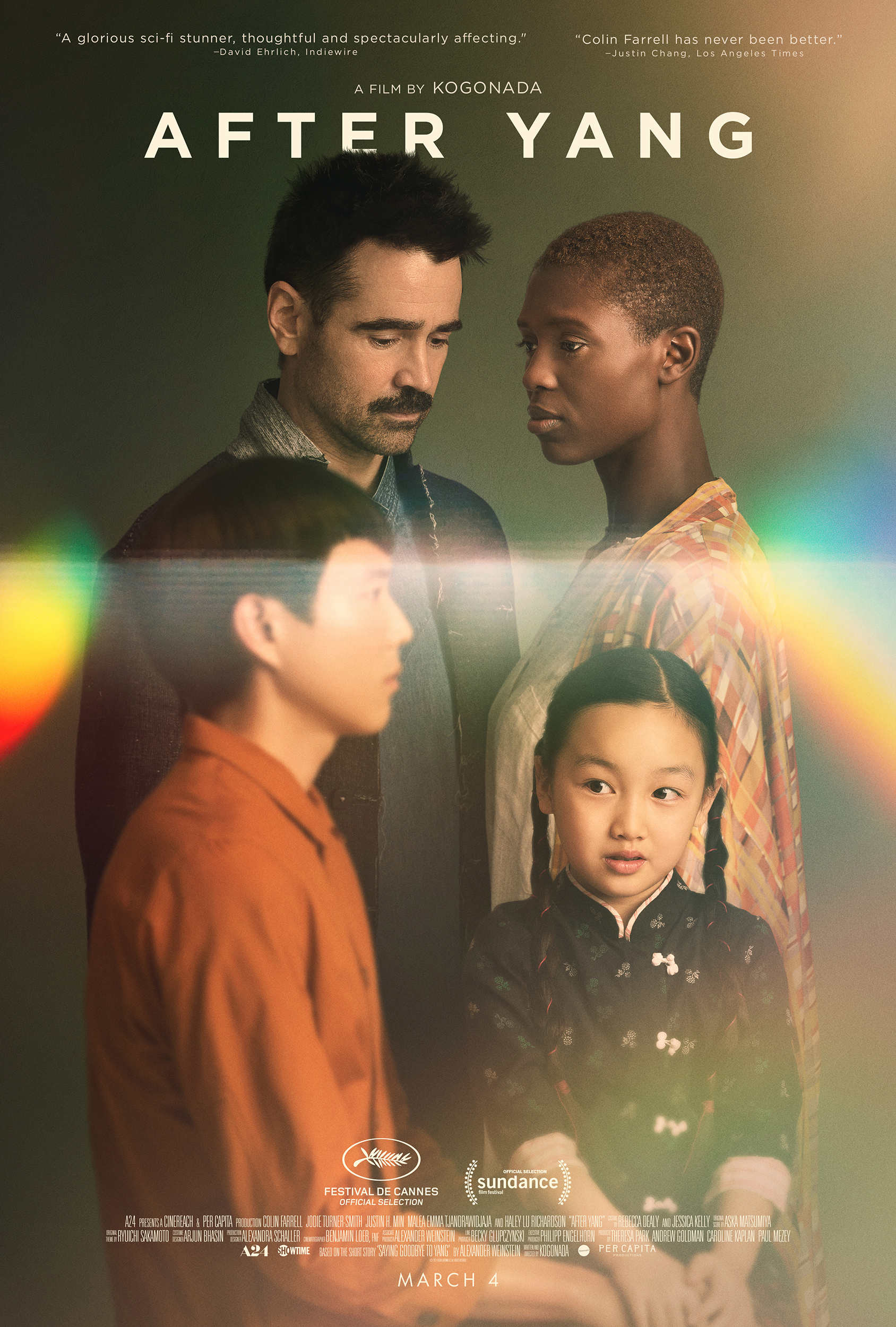Colin Farrell and Jodie Turner-Smith in After Yang



Kogonada follows his feature film debut, Columbus, with the sci-fi drama After Yang, a quiet, reflective work about family, humanity, and loss. Set in a future where technology has become so seamless it’s virtually invisible, people can buy “technosapiens”, a class of semi-organic robots engineered to perform specific tasks. One popular class of “technos” are synthetic siblings. One such techno, Yang (Justin H. Min), is the older brother of Mika (Malea Emma Tjandrawidjaja), a Chinese-born adoptee of Jake (Colin Farrell) and Kyra (Jodie Turner-Smith). Yang’s purpose is primarily to help Mika connect with her Chinese roots by teaching her the language and history of her homeland, but Jake and Kyra also rely on him to act as a caregiver, often leaving Yang to look after Mika as a parent would. However, one day Yang goes offline, and will not restart, and to appease his heartbroken daughter, Jake seeks to restore Yang and get him back online.
This leads Jake on an odyssey through the world of robot repair, which, for all the advancements in technology, very much resembles trying to get a computer fixed today. A chain repair shop charges a fortune for a fruitless diagnostic, a neighbor’s friend will cut a good deal, but you have to wade through his conspiracy crap, and, ultimately, the technology is unrepairable anyway. But while trying to fix Yang, Jake discovers Yang is implanted with a chip that conspiracist Russ (Ritchie Coster) thinks is spyware, but museum curator Cleo (Sarita Choudhury) recognizes as a banned memory card. Due to privacy concerns, technos like Yang aren’t supposed to record anything, but Yang has a chipset that allows him to record a few seconds each day and form memories. As Jake dives into Yang’s memories, he begins to confront his own humanity.
After Yang is exquisite in the details, with immaculately composed shots recognizable for Kogonada’s formalist style (the film is lensed by Benjamin Loeb). But it’s not a stuffy or strict film in any sense. There is enormous emphasis on the natural world, both in the production design (courtesy Alexandra Schaller) and the cinematography that focuses on long shots of trees and fields and sky, and domestic spaces decorated in natural textiles and warm, organic colors. It’s the future, but humanity seems closer to nature, even incorporating potted plants into driverless cars. But it’s not a perfect view of the future. There is still racism and xenophobia, and a host of new prejudices against technos like Yang, and clones like his friend, Ada (Haley Lu Richardson). Kogonada explores what really separates us, as Yang and Kyra discuss programming and its limits, and Yang suggests his programming isn’t so different from Kyra’s social conditioning.
But there are no easy, pat answers to be had. It’s not like Jake or Kyra have big, emotional revelations. This is a very quiet film, gently exploring the boundaries of existence through a speculative fiction lens, pondering the nature of humanity and determinism in a world where “human” is no longer the only state of being, but is still presumed to be the ideal. Humanity, memory, and identity are inextricably interwoven, but where does someone like Yang fit in, not human, but capable of forming memories and, thus, an identity, a set of likes, dislikes, and preferences that result from his remembered experiences and not his programming. And what does that mean for Mika, growing up in a family that loves her but does not look like her, and Jake and Kyra, raising a daughter with whom they do not share a cultural background?
In the vein of Her or a less murderous Ex Machina, After Yang imagines a future where technology allows an almost unimaginable level of convenience, but the eternal questions of purpose and life remain. Humanity has not figured itself out and has now foisted into the world new beings who struggle to fit into the schema of existence. Much as Columbus uses architecture to talk about family and grief, After Yang uses the technology to talk about identity and the self. And it does it with the sensitive, assured grace of Kogonada’s cinematic sensibility. After Yang is intimate, contemplative sci-fi at its best. Also, there’s a dance scene. Sci-fi is always better with a dance scene.
After Yang is in theaters and streaming on Showtime from March 4, 2022.

